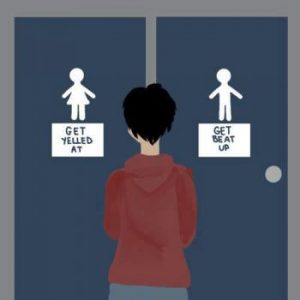I don’t know about you, but lately I’ve talked a lot about bathrooms—actually about bad “bathroom bills,” as I call them.
But let’s be clear: the laws being passed and the ballot initiatives proposed across the country, including here in Washington State, aren’t really about bathrooms. And they’re certainly not about protecting anyone, as many claim.
On their surface, these laws aim to exclude transgender people from public spaces. But that’s not all they do. The sentiment behind these laws points to a much deeper issue that impacts all of us—and one we must address directly.
I travel a lot for my work, so I spend a good bit of time in airports. While most people worry about long security lines or their luggage fitting in the overhead bin, I spend my time calculating whether to use the airport bathroom before getting on the plane.
For more than 30 years, nearly every time I walk into an airport bathroom (or any public bathroom, for that matter), people stop, sometimes abruptly, look at me, look at the sign on the bathroom door, glance around at everyone else, and then say with a phrase or a look: “I think you must be in the wrong place—this is the women’s bathroom.”
I’ve spent as long as I can remember just wishing this reality away—hoping that if I look down long enough, people won’t take notice and make assumptions about me based on my short hair, my collared shirt, and cuff links. Most times, however, I say, “Don’t worry, I’m not mistaken—I’m in the right bathroom.”
Yet, that feeling—of people being afraid of or disgusted by me—stays with me long after I leave the bathroom.
A stranger scrutinizing my gender is, unfortunately, an ordinary experience for me, and has been since I was young.
Like many LGBTQ people, I didn’t feel like I belonged in middle school after I realized I was gay. While I never shared those thoughts with anyone, I assumed people could sense it, and I attributed my being treated differently to my sexual orientation.
But it wasn’t until I was in high school and college when it finally dawned on me—I wasn’t an outsider because of my sexual orientation (or at least not primarily). I was an outsider because I didn’t look like, dress like, or act like a girl was supposed to.
I mostly escaped hateful actions and words since being a tomboy at that time was more easily accepted for girls, especially growing up in a farming community. However, my more feminine gay brethren usually did not have it as easy. I know far too many gay men who suffered painfully in their youth at the hands of classmates who made clear that anything but a traditional expression of masculinity was profoundly wrong.
For me, the deeper issue at stake behind these bad “bathroom” laws and initiatives is really about policing and controlling how each of us expresses our gender. The intention is to ensure that everyone continues to follow the gender norms dictated by our conventional culture.
The reality is, denying people the right to use public restrooms is systematically forcing many within our community back into the closet—into the shadows—where we are more isolated and our sense of dignity and full humanity are worn away.
The target of these laws are our friends and our neighbors. Many have been fully participating in society for years—using the restrooms that correspond with the gender they live as every day—and now are being forced to threaten their own safety and, in some places, even break the law in order to go to work, go to school, and live their lives.
For everyone in our community to be safe, we must challenge these pre-determined expectations about the way people can look, act, and dress that are at the heart of these discriminatory laws and initiatives.
Thankfully, organizations across our region are actively working to expand our understanding of gender and gender expression—grantee organizations such as Gender Expansion Project in Montana, Gender Justice League in Washington, Lotus Rising Project in Oregon, Identity, Inc. in Alaska, and Trans Latinas in Idaho.
For all LGBTQ and allied people, we have to understand the deeper impacts these laws have on our whole community and identify ways to resist the implicit assumptions and restrictive stereotypes that are imposed on all of us—no matter how we express our gender.
Rethinking and undoing this harmful and prescriptive understanding of gender that underlies so much homophobia and transphobia is a big task, and is certainly the long game we will need to continue to play if we are to ever achieve true lived equality.
No one deserves to risk harm in the process of living their lives, and it’s up to us to work together to actively resist these laws and initiatives that are hurting and excluding so many people in our community.
Kris Hermanns is the Executive Director of Pride Foundation. Email Kris.
